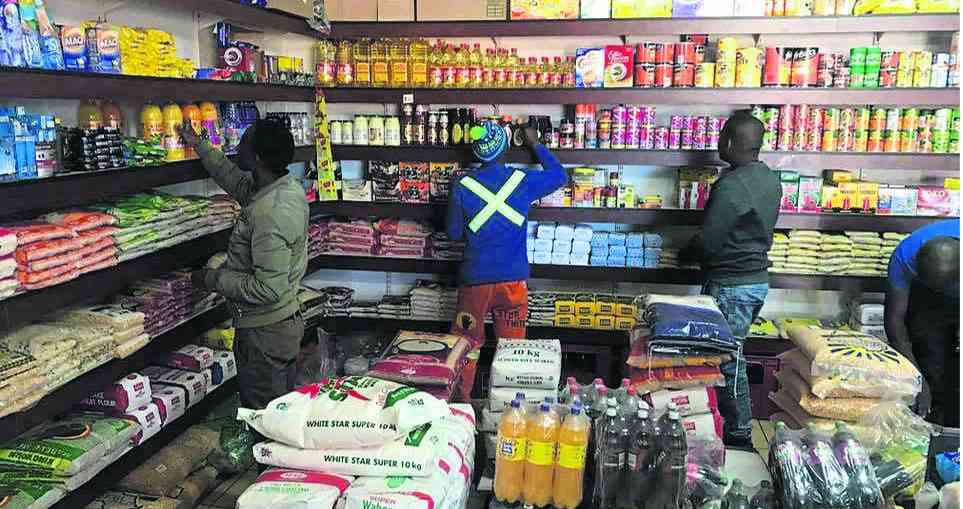
IN the busy streets of Harare, a quiet revolution is taking place in the retail landscape.
Established supermarket chains like Spar, OK Zimbabwe and Choppies are facing headwinds, with some even closing down.
The proliferation of informal tuckshops in downtown Harare is blamed for the tough situation the giant retailers find themselves in.
Others believe the tuckshops are filling a void, offering a lifeline to consumers in a challenging economic environment.
The term “Kuma tuckshops” has become popular in many suburbs of Harare.
These tuckshops are usually located near supermarkets, mostly about 30 to 40 metres away.
These are not typical corner stores but tuckshops, often operating out of small spaces and are known for their competitive pricing and personalised service.
They have become a common sight in Harare’s central business district, more so in downtown Harare.
- EcoCash, OK Zimbabwe seal partnership
- OK Zim ignites Christmas is Here promotion
- Business giant Chiura laid to rest
- Currency woes: Suppliers demand cash upfront
Keep Reading
The streets there are impassable, motorists experience difficulty in finding parking space.
For those located near large supermarkets, the proximity is not by coincidence.
It is a strategic move to capture consumers seeking affordability and convenience.
Some years ago, people used to be sceptical about the quality of products sold at these outlets, but today, the tuckshops have become a haven for many.
“Zvizere ende zvakachipa izvi kuma tuckshops (There is plenty and it’s cheap in tuckshops), a Kuwadzana woman Praise Kizito told NewsDay in an interview.
“We buy our groceries from tuckshops near Kuwadzana OK supermarket.
I do not remember when last I patronised big retail outlets because in most cases, they do not have all the products we want.
“It’s either expensive or its not available.”
She added: “We have our grocery club, whereby we make contributions every month and we buy basics in bulk and share twice a year.
“At times you cannot find some of the products in these struggling supermarkets."
Zimbabwe’s currency crisis and economic woes have led to high unemployment, making price a primary concern for shoppers.
Tuckshops, with their low overheads and often informal operations, usually offer goods at more competitive prices than larger retailers which grapple with taxes, import costs and other operational expenses.
As supermarkets exit the market, they leave behind a vacuum that tuckshops are eager to fill.
This creates a unique dynamic where the decline of formal retail involuntarily fuels the growth of the informal sector.
A survey carried around by NewsDay in areas such as Kuwadzana, Warren Park and Mufakose showed that the retail giants are struggling to survive in volatile economy.
During the paper's visit to the retail outlets, most shelves, including the butchery section, were empty.
An employee, who spoke on condition of anonymity, said they had to switch off the freezers because there was no meat.
Only two till operators were on duty, but during normal days when the shop is full with products, six or more till operators will be at work during a 12-hour shift.
Consumers also face the risk of buying substandard and counterfeit products.
Meanwhile, the Confederation of Zimbabwe Retailers (CZR) has sounded alarm bells over the precarious state of the country’s formal retail and wholesale sector.
CZR expressed concern over the continued closure of formal retail and wholesale businesses, which is a direct consequence of the prevailing turbulent economic environment that has consistently failed to support formalised sector players.
In a statement, CZR president Denford Mutashu said: “The recent closure of several outlets under the N Richards Group, coupled with Spar Zimbabwe’s painful decision to shut down Queensdale Spar, Choppies Zimbabwe’s exit from the market and Mahommed Mussa’s significant reduction of shop space by 60%, highlights the growing crisis.
“As the representative association for these and other brands, CZR is alarmed that while formal businesses face enormous challenges, the authorities continue to present a different picture of the operating environment.
“The unregulated informal sector offers goods at much lower prices, largely because it operates outside compliance with statutory obligations such as taxes, licensing fees and labour laws.
“This has made it increasingly difficult for formal businesses to compete effectively.
“CZR, therefore, calls for urgent intervention by President Emmerson Mnangagwa, to rescue what remains of the formalised retail and wholesale sector.”
OK Zimbabwe Limited started operations in 1942, N Richard’s Group had its first footprint in 1930 whereas Choppies entered the Zimbabwean market in 2013.
The year 2025 has seen these retail giants struggle to restock.
Government critic and economist Gift Mugano said the mushrooming of tuckshops, which are dotted all over the country, is a disaster rooted in poor policy-making.
He reiterated that the government, through the Finance ministry, has failed to come up with effective policies to protect retailers from the opportunists operating in tuckshops.
“The supermarkets which are closing are mainly hit by the current crisis, the exchange rate crisis, which has seen the official rate rendering competitiveness of the supermarkets or established businesses, formal businesses, difficult,” Mugano said.
“So, this has been coupled by the fact that the law enforcement agents were also enforcing it and it made it very difficult for them to replenish their stock. That is the reality.
“They have to find their way into the informal sector. If government was not putting policies which kill businesses, there wouldn't be an informal sector. Is there an informal sector in America? Is there an informal sector in Botswana to talk about, complain about, it isn’t a big issue because their policies are good.”
The concern by supermarkets comes on the back of a deteriorating economic environment which has seen formal retailers being elbowed out by informal businesses that do not pay taxes.










